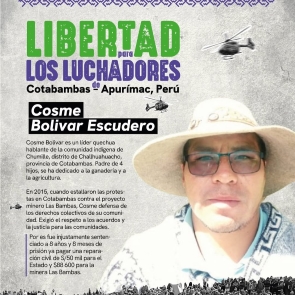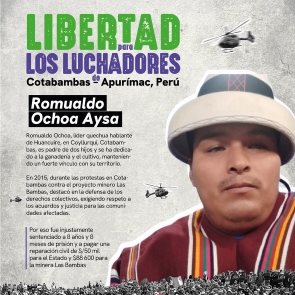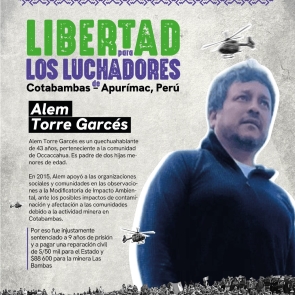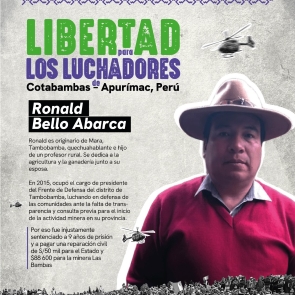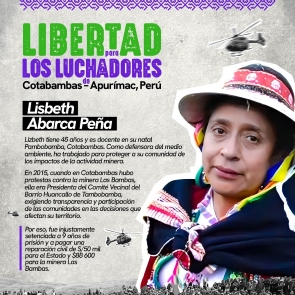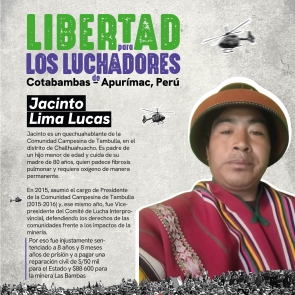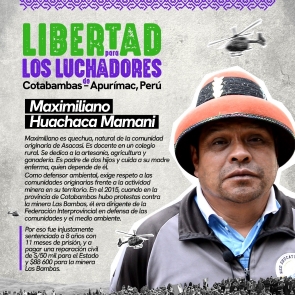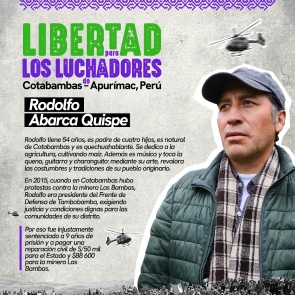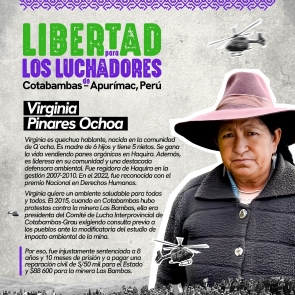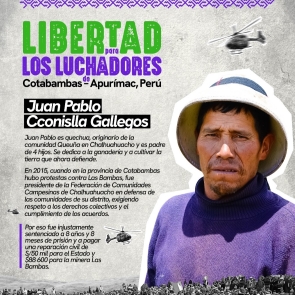Peru: Call to apply due process in forthcoming decision on eleven indigenous and campesino human rights defenders criminalised in Cotabambas
Front Line Defenders expresses its concern over the criminalisation process, which began a decade ago, against eleven human rights defenders and community leaders from Cotabambas (Apurímac) due to their opposition to the Las Bambas mining project. The organisation urges the Peruvian State to carry out the appeal process of the sentence, which started on 19 March 2025, in accordance with due process and with respect for the defendants' legitimate rights to defend human rights, acknowledged in the UN Declaration on Human Rights Defenders. The hearings section of the appeal process began on 31 March 2025 and is expected to end in the next 15 days. The next hearing is scheduled for April 4, in which the defence of the accused will take place. Each of the human rights defenders will have two minutes to testify.
The criminalised indigenous and campesino leaders Virginia Pinares Ochoa, Rodolfo Abarca Quispe, Lisbeth Abarca Peña, Ronald Andrés Bello Abarca, Juan Pablo Cconislla Gallegos, Maximiliano Huachaca Mamani, Alem Torre Garcés, Jacinto Lima Lucas, Walter Moreano Andrada, Romualdo Ochoa Aysa and Cosme Bolívar Escudero are members of various communities in the region of Apurímac affected by the activities of Las Bambas mining company. They are Quechua speakers, environmental defenders and community leaders, all of them part of originary communities, with histories of struggle against the harmful effects of large-scale mining on their territories and communities.
The judicial process against the defenders is due to events that took place in September 2015, when members of the campesino and indigenous communities of Cotabambas, affected by Las Bambas mining project, protested together to demand transparency regarding the information shared with the communities, and the application of prior consultation on the environmental and social impacts of the mining project, related towards the modification of the environmental impact assessment of the project. Rather than their demands being heard and addressed, the protest was suppressed by the police with a disproportionate use of force. Additionally, both the government and the company that owns the mining project filed complaints against the community leaders for the alleged offences of aggravated damage, rioting and hindering the operation of public services.
The criminal process started in 2015 and has been marked by due process errors and judicial biases favouring the mining company. The defendants' lawyers and Peruvian civil society organisations highlight that, among the issues, is a lack of fundamental and concrete evidence to link the defendants to the crimes, even after the review of videos, audio samples and statements. Additionally, the sentences that were later issued do not clearly substantiate the defendants' liability, omitting key aspects of the case and violating the principle of procedural consistency.
In July 2024, the Criminal Court of Cotabambas issued a sentence (File no. 41-2016) that condemned the eleven human rights defenders to prison sentences ranging from eight to nine years, as well as compensation of 50 000 soles to the State and 88 600 U.S. dollars to the mining company. The defendants' lawyers filed an appeal (File no. 00041-2016-40-0307-JR-PE-01), which initiated its procedures on 19 March 2025 at the Criminal Chamber of Appeals of the Supreme Court of Justice of Apurímac. Additionally, the Public Prosecutor's Office of the Ministry of the Interior has requested an increase in the civil reparation, in favour of the State, to 200 000 soles. The appeal seeks to reverse the decision, the effects of which are suspended pending the issuance of a final judgement. It is expected that the hearings of the appeal process will end in the next 15 days, with the date of the next hearing scheduled for 4 April 2025 .
The Las Bambas mining project is the biggest extractive operation of copper in Peru and the largest single property of a Chinese company in Latin America. It has caused significant social and environmental impacts in Apurímac, including air and noise pollution caused by the daily transit of 370 high tonnage trucks transporting minerals over 450 km to the port of Matarani. This traffic crosses 169 towns, affecting the quality of life of local communities. Local organisations and leaders have consistently reported that the project is marked by a lack of prior consultation, and its plans have been modified without the involvement nor consent of the affected communities.
Front Line Defenders understands that this judicial process began as a reprisal for the leadership roles the defendants took in advocating for indigenous and environmental rights, denouncing the negative impacts that the mining project causes over their territories and exercising their right to protest. It is urgent that the appeal process is held in accordance with due process and fair trial standards, as the confirmation of the sentence would set a concerning precedent that puts the right to defend human rights in Peru at risk.
This judicial persecution of the eleven campesino leaders is an example of the systematic pattern of criminalisation of human rights defenders, within the context of socio-environmental conflicts in Peru. In recent years, there have been multiple cases of community leaders being prosecuted on disproportionate charges simply for exercising their right to peaceful protest and participating in matters affecting their territories and livelihoods. International human rights institutions and experts, such as the UN Special Rapporteur on the situation of human rights defenders, have expressed their concern over the criminalisation patterns in Peru, and have urged the State to ensure the protection of defenders and avoid the undue use of criminal law to restrict their work.
Front Line Defenders reiterates its deep concern over the criminalisation of campesino and indigenous leaders and human rights defenders in Apurímac and the undue use of the justice system to restrict social protests and the defence of human rights and territories. The organisation urges the Peruvian authorities to drop all charges against the eleven human rights defenders of Apurímac and to adopt effective measures for their protection. Front Line Defenders also calls on the investors of the Las Bambas mining project to recognise the harmful actions that the company has taken in Peru, and urges the mining company to withdraw from the legal process and comply with the principles of due diligence. Front Line Defenders also urges the Peruvian State to implement effective protection mechanisms for the communities affected by extractive projects and to ensure prior, free and informed consultation processes as established in Convention 169 of the ILO. Finally, Front Line Defenders urges Peru to ensure that all human rights defenders can carry out their work in the country without fear of reprisals, including judicial harassment.
